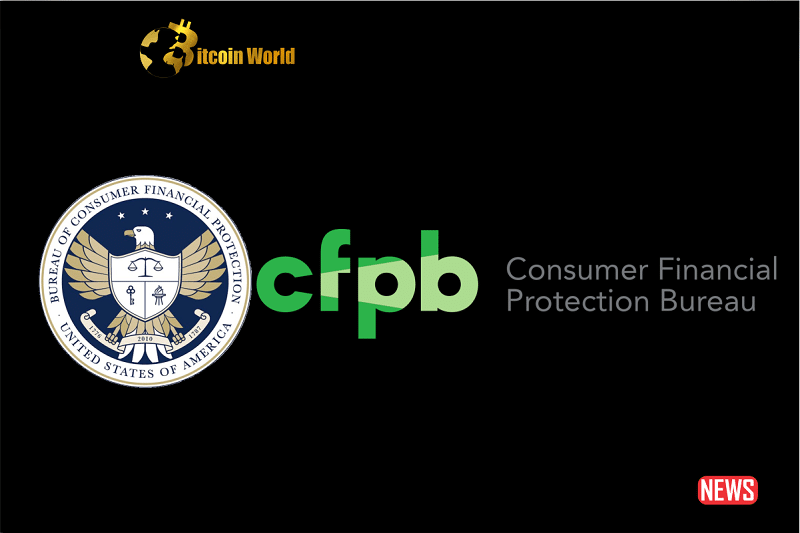In today’s fast-paced digital world, sending money to friends and family through payment apps like Venmo and PayPal has become second nature. But have you ever stopped to think about what happens to that money sitting in your app balance? Recent warnings from the US Consumer Financial Protection Bureau (CFPB) are a crucial wake-up call, especially in the wake of significant financial turmoil in both the traditional banking and cryptocurrency sectors.
Why is the CFPB Concerned About Your Payment App Balance?
The CFPB’s recent advisory highlights a critical point: the money you hold in many person-to-person payment apps isn’t protected by federal insurance. This might come as a surprise, especially considering the convenience and widespread use of these platforms. The CFPB’s report emphasizes the surge in transaction volumes on these apps, which, while showcasing their popularity, also exposes consumers to potential financial vulnerabilities.
Echoes of Past Crises: Why This Warning Matters Now
The CFPB’s caution isn’t coming out of the blue. The failures of major crypto entities like FTX and Voyager Digital, which resulted in hundreds of millions of dollars in losses for consumers, serve as stark reminders of the risks involved in unregulated or under-insured financial spaces. Similarly, the collapses of Silicon Valley Bank, Signature Bank, Silvergate Bank, and First Republic Bank have brought the importance of federal deposit insurance into sharp focus.
Understanding the Insurance Gap: Are Your Funds Really Protected?
So, what’s the difference between keeping money in a traditional bank and holding it in a payment app? Here’s the key distinction:
- Traditional Banks & Credit Unions: Typically offer federal deposit insurance through the Federal Deposit Insurance Corporation (FDIC) or the National Credit Union Administration (NCUA). This means your deposits are insured up to at least $250,000 per depositor, per insured bank.
- Payment Apps: Funds held in these apps are often not placed in insured accounts. This means if the payment platform itself faces financial difficulties or fails, your money could be at risk.
Crypto and Payment Apps: A Double Dose of Caution?
Many popular payment apps, like Venmo and PayPal, now offer cryptocurrency services. While this might seem like a convenient way to dabble in crypto, the CFPB specifically warns that funds associated with these crypto services often do not qualify for deposit protection. This adds another layer of risk to consider.
What Does FDIC Insurance Actually Mean for You?
The FDIC plays a crucial role in maintaining stability in the financial system. Here’s a quick look at its benefits:
| Benefit | Description |
|---|---|
| Deposit Protection | Insures deposits up to at least $250,000 per depositor, per insured bank. |
| Financial Security | Provides peace of mind knowing your money is safe even if the bank fails. |
| System Stability | Helps prevent bank runs and maintains confidence in the banking system. |
Learning from the Bank Failures: A Case Study
The failures of Silicon Valley Bank, Silvergate Bank, and Signature Bank in March sent shockwaves through the financial world. FDIC Chair Martin Gruenberg specifically pointed to weak management and reliance on uninsured crypto deposits as contributing factors in Signature Bank’s downfall. These events underscore the importance of sound risk management, especially when dealing with uninsured funds.
So, What Can You Do to Protect Yourself?
The CFPB’s advisory isn’t meant to scare you away from using payment apps, but rather to encourage informed decision-making. Here are some actionable insights:
- Be Mindful of Balances: Avoid keeping large sums of money in your payment app for extended periods. Treat it more like a temporary holding place for transactions.
- Understand the Terms: Familiarize yourself with the terms of service of your payment app to understand how your funds are held and whether they are insured.
- Consider Alternatives for Savings: For long-term savings, stick to traditional bank accounts or credit unions that offer FDIC or NCUA insurance.
- Stay Informed: Keep up-to-date on financial news and warnings from regulatory bodies like the CFPB.
The Bottom Line: Awareness is Your Best Defense
In conclusion, the CFPB’s warning serves as a timely and crucial reminder in our increasingly digital financial landscape. While payment apps offer unparalleled convenience, it’s essential to understand the potential risks involved, particularly the lack of federal insurance for your balances. By being aware of these limitations and taking proactive steps to manage your funds, you can navigate the evolving financial ecosystem with greater confidence and security. Don’t let the ease of use lull you into a false sense of security – knowing where your money is and how it’s protected is paramount.
Disclaimer: The information provided is not trading advice, Bitcoinworld.co.in holds no liability for any investments made based on the information provided on this page. We strongly recommend independent research and/or consultation with a qualified professional before making any investment decisions.


